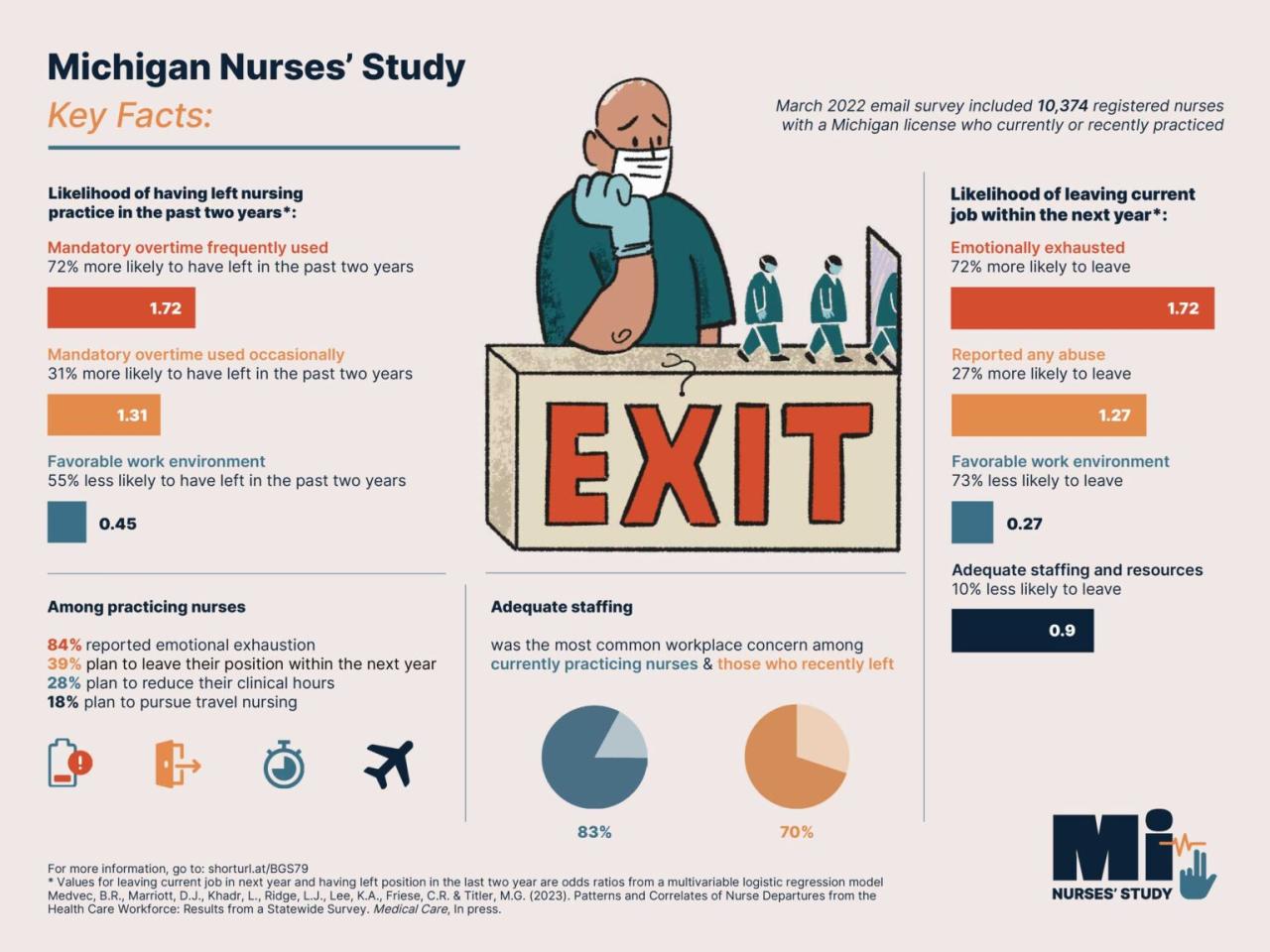

Nearly 4 in 10 nurses in Michigan plan to quit soon
About 39% of nurses in the state of Michigan say they intend to leave their jobs in the next year, according to a U-M study.
About 39% of nurses in the state of Michigan say they intend to leave their jobs in the next year, according to a University of Michigan study.
For years, nurses have detailed chronically poor working conditions and health care executives have warned of impending nursing staffing shortages—but few recent studies have asked nurses directly about their employment plans.
To that end, U-M researchers asked 9,150 state-licensed nurses in Michigan about their plans to leave their current nursing jobs, reduce hours or pursue travel nursing in the Michigan Nurses Survey. They also surveyed 1,224 nurses who left their nursing positions within the past two years.
The researchers hoped the study would paint a clearer picture for Michigan and inform solutions, said study lead author Christopher Friese, Ph.D., R.N., AOCN, the Elizabeth Tone Hosmer Professor of Nursing. The findings appear in the journal Medical Care.

Michigan Nurses Survey findings infographic. Image courtesy: Christopher Friese. Accessible PDF
The survey shows that many nurses plan to quit or reduce hours. The following numbers pertain to nurses without advanced degrees—the workforce most in need:
- While 39% of nurses, overall, intend to leave their jobs in the next year, more than half of young nurses plan to do so: 59% for nurses under 25; 53% for nurses 25-35; and 45% for nurses 65 or older.
- 28% plan to reduce their clinical hours.
- 18% intend to pursue travel nursing.
- 84% say they are emotionally exhausted.
- 60% reported inadequate staffing and resources to deliver patient care.
- 43% report emotional abuse, 22%, reported physical abuse, 10% reported sexual abuse and 26% reported workplace bullying.
Top workplace concerns included inadequate staffing, patient safety and staff safety; promotions and compensation were the least frequently mentioned concerns; mandatory overtime was associated with a higher likelihood of departure in the past two years.
What do these numbers mean?
Friese said the most troublesome finding is how many younger nurses want to leave.
"This should set off alarm bells for everyone who cares about Michigan's health care workforce," he said. "The fact that our youngest nurses are showing the highest likelihood of leaving tells us we can't just add more nurses to the problem. This rate of departures and vacancies is not sustainable and executives need to undertake urgent actions to improve working conditions."
The finding that nearly 4 in 10 nurses plan to leave in the next year is also very troubling, Friese said.
"I've surveyed nurses multiple times in my 25-year career in nursing and this is the highest number I've seen," he said. "Also, 84% reported emotional exhaustion. These numbers really stand out to me."
What does this mean for Michigan?
This is bad news for a state with an aging population, large swaths of rural, hard-to-reach areas and existing staffing vacancies, Friese says, but new policies could help. For instance, Michigan is one of roughly half of states that don't grant nurse practitioners full practice authority, meaning they cannot practice without physician oversight.
Michigan could also join a compact of 39 other states to allow nurses with licenses in other states to practice more easily in Michigan. These restrictions were relaxed during the height of COVID-19, but were subsequently reinstated. Minimum staffing proposals and anti-violence legislation would also help, Friese says.
COVID isn't the cause—it highlighted the problem
COVID was not a primary cause for planned or actual departure, Friese said.
"Many health care leaders think that the COVID pandemic will ease and the workforce burden will ease also," he said. "But nurses are telling us that they're leaving because of the unsafe working conditions and chronic understaffing that predated the pandemic. It made an already bad and unsafe situation even worse."
Study: Patterns and correlates of nurse departures from the health care workforce (DOI: 10.1097/MLR.0000000000001837)

